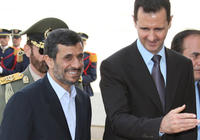-
Nuclear cooperation with non-NPT member states debated
The United States, Britain, and the Czech Republic have all backed a Dutch paper tied to the meeting last week of the Nuclear Suppliers Group (NSG) which urges closer ties with nuclear-capable countries outside of the Treaty on the Non-Proliferation of Nuclear Weapons (NPT), including Israel, Pakistan, and India. Opponents of the Dutch proposal say it would legitimize the proliferation of nuclear weapons, while supporters say the proposal merely recognizes reality.
-
-
European, American jihadists training in Syria are the next major threat to the West

Islamic militants who travel back and forth between their home countries and Syria may be the next major threat to the West. Some al-Qaeda leaders have been leaving their posts in Pakistan and Afghanistan to go to Syria, with plans to help train the next generation of jihadis. During the 1990s, al-Qaeda used unstable regions in Afghanistan as a training ground for Islamist militants. Getting into Afghanistan was difficult, however, while gaining entry into Syria and then joining a rebel camp is easy due to Syria’s porous borders with Turkey and Lebanon and the decentralized nature of Syrian opposition groups.
-
-
New consortium dedicated to developing nuclear arms control verification technologies
A consortium of thirteen universities and eight national laboratories, led by the University of Michigan and including the Los Alamos National Laboratory as a partner, has been awarded a $25 million grant by the NNSA. The consortium is dedicated to the research and development (R&D) of nuclear arms control verification technologies, including nuclear safeguards effectiveness.
-
-
Hundreds of Britons are terror-training in Syria, making attack on U.K. “inevitable”
Thousands of foreign fighters, including hundreds of Britons, are now in Syria, fighting with rebel forces against the regime of Bashar al-Assad. Security experts say that the danger faced by Britain and other countries from jihadist fighters returning from Syria is “unprecedented,” and that a terror attack on British soil by one or more British Muslims returning from Syria is “inevitable.” “All the reports I have seen suggest that it is becoming increasingly acute,” said Gilles de Kerchove, the EU’s counterterrorism coordinator. “National budgets devoted to counter-terrorism are declining across the EU. Yet the threat that we face is becoming more diverse, more diffuse, and more unpredictable.”
-
-
Anti-immigrants backlash in Europe intensifies
Anti-immigration groups and parties are enjoying a surge in many European countries, including Britain, France, and Austria, as many European economies face high unemployment and declining wages. The open-border policies of the European Union (EU), which allow citizens of EU member states to work and receive social welfare anywhere within the EU, have led many citizens to call for immigration limits and quotas.
-
-
France's new approach to preventing French Muslims from going to fight in Syria

French authorities reported in January 2014 that roughly 700 French residents had traveled to Syria to join in the fight against Syrian forces. The travel of French pro-jihadists to Syria exceeds the number of Europeans who left to fight in Iraq and Afghanistan. France will soon adopt preventative measures, currently practiced in Britain, Denmark, and the Netherlands, to stop minority youths from pursuing jihad in Syria. The new approach will encourage local law enforcement, schools, and community leaders to help identify at-risk youths before radicalization begins and advances, then introduce the youths to local prevention centers.
-
-
House mulls Syria-related sanctions on Iran

U.S. House legislators are considering new terrorism-related sanctions on Iran, targeting the country’s support for Hezbollah, after ceding to the Obama administration’s request to back off on sanctions related to Iran’s nuclear program. The House Foreign Affairs Committee hopes the move will reflect their independence from the White House and also bring more focus to the Syrian crisis.Lawmakers say the bill would reflect the most effective ways to disrupt Iran’s financial support of Hezbollah.
-
-
Post-Qaddafi Libya needs more international support: study

The international community’s limited approach to postwar Libya has left the nation struggling and on the brink of civil war, according to a new study from the RAND Corporation. Libya’s most serious problem since 2011 has been a lack of security, which has undermined efforts to build functioning political and administrative institutions, further constricted an already minimal international footprint, and facilitated the expansion of criminal and jihadist groups. The lack of security stems primarily from the failure of the effort to disarm and demobilize rebel militias after the war.
-
-
Libyan PM escapes country after assembly ousts him over oil tanker fiasco
Libya’s General National Congress has approved a no-confidence motion against Prime Minister Ali Zeidan and designated the defense minister as acting prime minister. Zeidan left Libya after the vote, in all likelihood for Italy. The no-confidence vote came after a North Korean-flagged tanker named Morning Glory managed to sail away from the port of al Sidra, carrying 234,000 barrels of crude oil from rebel-held oil fields. Last summer, armed militias in east Libya took over most of the country’s oil fields – and also three ports, with partial control of a fourth — bringing oil exports, which had amounted to 1.6 million barrels a day, to a halt. U.S. describes oil sale by the militias as “theft” from the Libyan people.
-
-
East Europe’s natural gas networks vulnerable during conflicts and crises
Gas networks in Eastern European countries, such as Ukraine and Belarus, are less resilient than the U.K. gas networks during conflicts and crises, according to new research. The authors suggest that a decentralized approach to managing congestion on gas pipeline networks could be crucial for energy security during geopolitical conflicts or natural disasters, for example.
-
-
Israel open to offering missile defense coverage to Jordan, Egypt
With worries about Iran military capabilities growing, a U.S. general on Monday said that Israel should consider extending the coverage area of its missile defense systems so they could cover Jordan and possibly Egypt, and an Israeli official cautiously welcomed the idea. The United States has funded most of the research and development work on Israel’s layered ballistic missile and short-range rocket defense systems, and under the Obama administration, Israel’s deployed missile interceptor systems have been integrated with U.S. global missile tracking and regional missile defense systems.
-
-
Scotland demands U.K. govt. apology over radiation leak at MoD nuke facility
In 2012 the U.K. Ministry of Defense decided to refuel the nuclear reactor on board Britain’s oldest nuclear submarine, HMS Vanguard, after a test reactor operating at the Naval Reactor Test Establishment at Dounreay, Caithness, in Scotland was found to have a small internal leak of radiation. The test reactor had been shut down after the fault was detected, and both the independent Defense Nuclear Safety Regulator and the Scottish Environment Protection Agency (SEPA) had been informed. It now appears that SEPA did not share the information with the Scottish cabinet, or with Alex Salmond, the First Minister of Scotland. Salmond, in a scathing letter to British Prime Minister David Cameron, has demanded an apology from Camron for “disrespecting” the Scottish Parliament and the people of Scotland and for treating both in an “underhanded” manner by not sharing the information about the radiation leaks.
-
-
Foreign support for rival sides in civil war makes post-war democracy less likely

From Ethiopia to Nicaragua, countries that go through civil war are much less likely to become democratic if the winning side gets help from rival nations, a new study finds. The study examined 136 civil wars from 1946 to 2009, 34 of which involved rivals aiding the winning side. Of those thirty-four countries, only one — Algeria — bucked the trend by becoming significantly more democratic over the next decade. The others either remained undemocratic or became substantially more repressive after the civil war.
-
-
Iran-Russia oil deal threatens nuclear negotiations
Iran said that in exchange for Iranian oil, Russia could build a second reactor at Iran’s Bushehr nuclear power plant. Russia could also provide Iran with trucks, railroad tracks, mini-refineries, grain, and other goods for Iranian oil. In a deal worth $1.5 billion a month, Iran would export 500,000 barrels of oil per day to Russia. The deal would increase Iran’s oil exports, which have been reduced to about one million barrels a day by American and European sanctions aimed at curbing Iran’s nuclear program.
-
-
Researchers tackle rare Earth materials shortage
The demand for rare Earth materials is growing much faster than production. Rare Earth metals do occur in the earth’s crust, but not in sufficiently high concentrations. This is why only one country — China — has so far been supplying the entire world with these elements. In recent years, however, China has begun to restrict its export of these materials. European research organizations have teamed up to address growing rare Earth materials by examining a more focused approach to recycling scrap.
-
More headlines
The long view
No Nation Is an Island: The Dangers of Modern U.S. Isolationism
The resurgence of isolationist sentiment in American politics is understandable but misguided. While the desire to refocus on domestic renewal is justified, retreating from the world will not bring the security, prosperity, or sovereignty that its proponents promise. On the contrary, it invites instability, diminishes U.S. influence, and erodes the democratic order the U.S. helped forge.
Fragmented by Design: USAID’s Dismantling and the Future of American Foreign Aid
The Trump administration launched an aggressive restructuring of U.S. foreign aid, effectively dismantling the United States Agency for International Development (USAID). The humanitarian and geopolitical fallout of the demise of USAID includes shuttered clinics, destroyed food aid, and China’s growing influence in the global south. This new era of American soft power will determine how, and whether, the U.S. continues to lead in global development.
Water Wars: A Historic Agreement Between Mexico and US Is Ramping Up Border Tension
As climate change drives rising temperatures and changes in rainfall, Mexico and the US are in the middle of a conflict over water, putting an additional strain on their relationship. Partly due to constant droughts, Mexico has struggled to maintain its water deliveries for much of the last 25 years, deliveries to which it is obligated by a 1944 water-sharing agreement between the two countries.
How Disastrous Was the Trump-Putin Meeting?
In Alaska, Trump got played by Putin. Therefore, Steven Pifer writes, the European leaders and Zelensky have to “diplomatically offer suggestions to walk Trump back from a position that he does not appear to understand would be bad for Ukraine, bad for Europe, and bad for American interests. And they have to do so without setting off an explosion that could disrupt U.S.-Ukrainian and U.S.-European relations—all to the delight of Putin and the Kremlin.”
